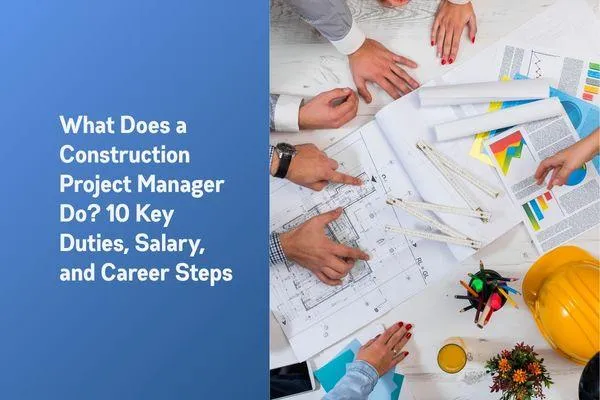
What Does a Construction Project Manager Do? 10 Key Duties, Salary, and Career Steps
If you’ve ever walked past a construction site and wondered who keeps all the moving parts in sync, the answer is usually the construction project manager. From overseeing budgets and schedules to making sure safety rules are followed, this role is the backbone of every successful build.
Whether you’re thinking about stepping into this career or just curious about what the job involves, this guide breaks down exactly what a construction project manager does, what skills you’ll need, and why this role matters more than ever.
What Does a Construction Project Manager Do? 10 Key Duties, Salary, and Career Steps
What is a Construction Project Manager?
10 Key Responsibilities of a Construction Project Manager
1. Planning the Entire Project
4. Hiring and Overseeing Subcontractors
8. Communicating with Stakeholders
9. Handling Documentation and Permits
10. Solving Problems as They Come Up
What a Typical Construction Project Manager's Day Looks Like
How Construction Project Managers Compare to Other Roles
What Are the Essential Skills of a Construction Project Manager?
Training and Certification for PM
How Much Do Construction Project Managers Earn?
National Average Salary of CPM
Steps to Become a Construction Project Manager
3. Learn Project Management Software
4. Earn Professional Certifications
What is a Construction Project Manager?
A construction project manager plans and runs building projects from start to finish. They set budgets, create schedules, hire contractors, and keep everything moving forward. If problems arise, such as delays or cost overruns, they find solutions quickly.
This role differs from that of a construction manager, who focuses primarily on day-to-day work at the site. A project manager looks at the bigger picture, handling paperwork, contracts, and communication with clients. In short, they’re the person making sure the job gets done right, on time, and on budget.
10 Key Responsibilities of a Construction Project Manager
Below are the main duties every construction project manager handles, along with real-world context to show how each fits into daily work.

1. Planning the Entire Project
Every successful build starts with a clear plan. According to the Project Management Institute, thorough planning is the #1 factor behind on-time, on-budget delivery.
The project manager defines what the project includes, how long it should take, and what resources it will need. This roadmap helps avoid misunderstandings and sets expectations from day one. Good planning also means identifying risks early and deciding how you’ll handle them.
👉 Want fewer delays and tighter budgets? Learn how construction teams are using AI to manage projects more efficiently without adding complexity.
2. Managing Budgets and Costs
Keeping finances under control is essential. A construction project manager creates cost estimates for labor, materials, and equipment, then tracks spending as work progresses.
It’s common for unexpected expenses to pop up. So the job is to:
Approve invoices and change orders
Adjust forecasts as needed
Explain any budget shifts to clients
“Every project is an opportunity to learn, to figure out problems and challenges, to invent and reinvent.” – David Rockwell
3. Coordinating Schedules
Schedules can change daily in construction. One late delivery or weather delay affects everything.
A construction project manager builds a master schedule, then updates it constantly to reflect real progress. This means coordinating:
Deliveries
Crew assignments
Inspections
Communicating these updates quickly keeps everyone moving in the same direction.
4. Hiring and Overseeing Subcontractors
Construction project managers are responsible for bringing in the right subcontractors and making sure their work meets project standards.
This includes negotiating contracts, defining expectations, and handling any disputes that come up. Strong relationships with subcontractors often mean fewer delays and higher quality results.
5. Enforcing Safety Standards
Safety isn’t optional; it’s the law and the right thing to do. A construction project manager sets and enforces safety rules to protect everyone on site.
Conduct regular safety inspections
Make sure teams follow OSHA guidelines
Train workers on proper procedures
A single safety lapse can stop a project in its tracks, so vigilance here is critical.
6. Monitoring Quality Control
Throughout the project, the construction project manager reviews work to ensure it meets design specs and quality standards. This can mean inspecting materials, checking completed tasks, or documenting compliance.
Quality control prevents costly rework and keeps clients satisfied with the final product.
7. Managing Risks
Even the best plan can’t avoid every problem. A construction project manager's job is to look ahead, spot issues early, and build backup plans.
This often involves:
Assessing what could go wrong
Creating contingency strategies
Keeping records of how problems were handled
Being proactive here saves time and money down the line.
8. Communicating with Stakeholders
Construction project managers are the central hub for updates and decisions. They keep everyone in the loop, from clients and architects to inspectors and crews. Regular meetings, status reports, and quick responses build trust and prevent surprises.
9. Handling Documentation and Permits
Construction projects create mountains of paperwork. They keep contracts, permits, and records organized to protect your company legally and financially.
This admin work might not be glamorous, but it’s a big part of keeping projects compliant and moving forward.
10. Solving Problems as They Come Up
No day is without challenges: material delays, weather issues, or staffing shortages. A good construction project manager doesn’t panic. He/She stays focused, finds solutions fast, and keeps work on track.
Problem-solving is often what separates an average PM from a great one.
What a Typical Construction Project Manager's Day Looks Like
No two days are the same, but most construction project managers follow a rhythm that keeps projects moving.
Your mornings often start early with a site visit or team check-in. You’ll walk the job site to see what’s happening firsthand, checking progress, safety compliance, and any issues that cropped up overnight.
Back at the office or job trailer, you’ll review schedules, update budgets, and handle emails from clients or subcontractors. Much of your day is spent coordinating details: confirming deliveries, answering questions, and adjusting plans as new information comes in.
Common challenges include:
Weather delays that throw off timelines
Subcontractor conflicts over scope or payment
Materials arriving late or not meeting specifications
A good project manager keeps calm under pressure. You’ll solve problems as they happen and communicate changes clearly so everyone stays aligned. While the pace can be demanding, it’s also what makes this career rewarding. No day is boring, and every project brings something new.
👉 Whether you're new or seasoned, this all-in-one guide to construction project management gives you the structure and tools to manage smarter.
How Construction Project Managers Compare to Other Roles
Construction projects rely on several leadership roles that sound similar but have very different responsibilities. Here’s how they compare:

Construction Project Manager
This role oversees the entire project from planning to closeout. A project manager handles:
Budgets and contracts
Scheduling and risk management
Communication with clients, architects, and inspectors
They see the big picture and make sure every part of the project comes together on time and within budget.
Construction Manager
A construction manager is more focused on site operations. They supervise day-to-day work, coordinate subcontractors, and solve immediate problems at the job site. While project managers often split time between the office and the field, construction managers spend most of their time on-site.
Construction Foreman
A foreman directly oversees a specific crew or trade, such as carpenters or electricians. They:
Assign tasks to workers
Train and supervise the crew
Check work quality daily
The foreman reports to the construction manager or project manager, depending on the project structure.
In short:
Project Managers coordinate everything, from budgets to client updates.
Construction Managers keep daily operations on track.
Foremen lead the hands-on work crews.
What Are the Essential Skills of a Construction Project Manager?
If you want to succeed in this role, you’ll need a mix of technical know-how, leadership abilities, and the right training. Here are the essentials:
Strong Communication: You’ll spend most of your day talking with clients, crews, and subcontractors. Clear communication keeps everyone aligned and prevents misunderstandings.
Organization and Time Management: Juggling budgets, schedules, and paperwork requires excellent organization skills. You’ll need to track dozens of moving parts without missing details.
Problem-Solving: Unexpected issues are part of the job. A good project manager can stay calm, think quickly, and find solutions fast.
Financial Management: From estimating costs to approving invoices, you’ll need a firm grasp of budgeting to keep projects profitable.
Technical Knowledge: Understanding construction methods, materials, and regulations helps you spot potential issues and set realistic expectations.
Leadership: You’ll guide teams, motivate subcontractors, and keep everyone focused on the goal. Respect and clear direction go a long way on a busy job site.
Negotiation Skills: Whether you’re securing contracts or resolving disputes, you’ll often need to find compromises that keep the project moving forward.
Familiarity with Project Management Software: Tools like Procore, Buildertrend, or Microsoft Project help you track tasks, budgets, and documents in one place.
Training and Certification for PM
Most construction project managers have a degree in construction management, engineering, or a related field. Certifications like PMP (Project Management Professional) or CCM (Certified Construction Manager) can also boost your credibility and career prospects.
How Much Do Construction Project Managers Earn?

Construction project manager salaries can vary widely based on factors like experience, location, and industry. Here’s what the latest data reveals:
National Average Salary of CPM
ZipRecruiter reports an average annual salary of $97,768 (about $47/hr) in the U.S. as of June 2025. Most earn between $75,000 and $119,000, while top-tier PMs make up to $137,000.
The U.S. Bureau of Labor Statistics (BLS) shows a median pay of about $106,980 per year for construction managers (a role very similar to project managers).
Consider Experience Levels
Entry-level PMs (0–1 year) typically earn $50–55K annually.
Project managers with 1–5 years experience make around $64K, increasing to $75K with 5–10 years under their belt.
Those with more than 10–15 years experience earn $85K–112K+.
Location Matters
Some areas like Soledad, CA, pay up to $146K, significantly above the national norm.
Large metro areas and high-cost regions frequently offer 20–30% higher salaries than the national average.
Commercial vs. Residential
PMs in commercial construction roles earn about $106,711, roughly 9% above the national average.
Residential or smaller-scale project managers often fall on the lower end of the pay range.
TL;DR: Expect pay between $75K–120K+, depending on your experience, location, and specialization.
Steps to Become a Construction Project Manager

If you’re thinking about this career path, you don’t have to follow one exact route. But most project managers build a mix of education, experience, and certifications over time. Here’s how to get started and move up:
1. Get the Right Education
Most employers prefer a bachelor’s degree in construction management, civil engineering, architecture, or a related field. Some managers start in the trades and work their way up, combining hands-on experience with additional training.
2. Gain Field Experience
Real-world experience is essential. Many PMs spend several years as assistant project managers, site engineers, or foremen to learn how projects run day to day. This background helps you understand what crews need and how to solve problems on site.
3. Learn Project Management Software
Familiarity with tools like Procore, Buildertrend, or Microsoft Project is a big plus. These platforms keep schedules, budgets, and documents organized.
4. Earn Professional Certifications
Certifications can strengthen your résumé and show you take the role seriously. Common options include:
PMP (Project Management Professional) from PMI
CCM (Certified Construction Manager) from CMAA
Associate Constructor (AC) for entry-level candidates
5. Build Your Soft Skills
Strong communication, negotiation, and leadership skills are just as important as technical know-how. Leading diverse teams and managing clients requires patience and clarity.
6. Keep Learning
Construction trends and regulations change constantly. Attending workshops, joining industry associations, or earning advanced certifications can help you stay ahead.
What Makes a Construction Project Manager Stand Out?
Technical skills will get you in the door, but it’s your mindset and daily habits that set you apart in this role. Here are the traits great construction project managers share:
Proactive Problem-Solving: Strong project managers don’t wait for issues to escalate. They spot risks early, make decisions quickly, and keep work moving without panic.
Clear Communication: Every day involves explaining complex plans, negotiating with subcontractors, and updating clients. Clear, respectful communication builds trust and prevents confusion.
Adaptability: Schedules shift, materials run late, and weather disrupts plans. The best PMs adjust without losing focus on the end goal.
Attention to Detail: Whether reviewing contracts or inspecting work, top performers don’t cut corners. They double-check the small things that can cause big problems later.
Commitment to Learning: Construction evolves constantly. Great managers stay current with new regulations, tools, and industry trends so they can lead confidently.
Strong Leadership: Earning respect from crews, contractors, and clients takes consistent fairness, clear direction, and follow-through. People trust managers who lead by example.
Final Words From Purely Startup
If you already know what does a construction project manager do, you also know the impact a great PM can have on every job. Whether you want to advance into larger projects, specialize in a new sector, or fine-tune your skills, the next step starts here.
Book a free consultation today to explore advanced certifications, career growth strategies, or new project opportunities tailored to experienced construction project managers. Let’s make sure you’re set up for your next big success.


